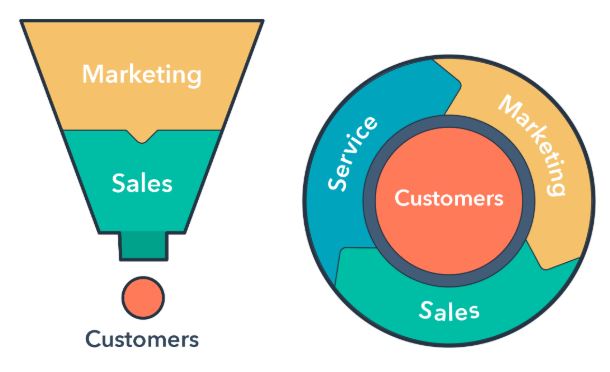The most important thing to understand about sales is that it’s a cyclical process. Things tend to reach peaks during the holiday season and troughs during times of the year when people are less likely to spend money or they have other things occupying their time and attention (like summer vacation for example). Sales teams are probably working harder right now than they ever have during this time. The days are longer, workweeks are usually more than five days long and they’re pushing themselves to the limit to hit their targets because of it.
While we hate to admit it, only 30% of the workforce is engaged at work(Source: Gallup). Sadly, that means it's fairly easy to predict what will happen next - like low quota attainment and a high turnover rate. For example, if only 58% achieved their quota last quarter, that probably won't change very much this quarter because 58% of the new people hired will be looking to fill the empty seats left on your sales team. What’s more is that according to our data, replacing an under-performing worker costs about 150% of their annual salary. This means your company will spend two months trying to find a replacement for just one person and be out a couple hundred thousand dollars in the process.
So, How do you solve this? To prevent culture erosion you need to stay two steps ahead at all times and create a culture of employee engagement. Isn't this how the best of companies go the extra mile to achieve their goals? Well, it turns out that creating a strong engagement culture may be just as important to boosting productivity. Now, what’s more, rewarding than cultivating employees who are creatively invested in helping your company become exceptional? I'm about to show you how one can create such a culture by making sure all staff understands their role in achieving the high goals you've set for your company in seven clear steps!
Culture of Engagement: What Is It?
Before you build your culture of salespeople there’s something that matters to take into consideration. A culture of sales engagement isn’t just about bringing on some more employees so you can shoot zombies in the office, get lost out in a maze for an hour with nothing but flashlights and some pizza slices, or have themed office parties. To have a true sales culture your people must actually love being a part of your team and enjoy their jobs as much as possible so make sure that every employee is happy with what they do and what they are experiencing as a whole.
An important point here is, Satisfaction and engagement are two different things. Satisfied employees usually don't care if they keep a job or not, while engaged employees care deeply about helping their companies be the best they can (even if they move on to another company in the meantime). Here's how you can know whether your employees are satisfied or engaged:
- Security: It is safe for me to show my true self at work without fear of repercussion.
- Meaning: My work is motivated by a personal 'why.'
- Capacity: My capabilities allow me to accomplish the tasks I am given.
As leaders, our primary goal is to emphasise performance and motivate teams upward. We do our very best to micromanage their engagement levels so that their mindset is primed toward high productivity. The result is everybody thinking like an owner and taking on a particular project, to build it up into a business venture. But how to get there?
The Emplify Way - Here is a different spin on the classic sales team training focus, which for many companies has become too limited and generic when it comes to real-world use. Rather than worry about how to play the game of being a great seller, we want instead to focus on helping our clients grow an environment that encourages positive results and aligns with the strategy of our clients specifically.
How to build a high-performing sales team?
1. Hiring culture warriors based on their attributes is step one
Who on your team possesses the skills and qualities that embody what you’re trying to build for your company? Think about staff members who are always producing high results despite being relatively new in their roles or perhaps even having come from another department. Those are your culture warriors and you should be keeping them close! Remember that every person in your team plays a major part in your business as a whole. From marketers to developers and customer service reps, each one of them not only has their talents, but they all work together as one force.
We recommend you pay close attention to anyone who performs outstandingly at their jobs regardless of where or when they do it. Do they bring something extra with them? Do they challenge themselves? Are they eager and willing to learn new things? These are the traits that signify how well the people around you work together because, without them, your business will crumble.
2. Giving cultural warriors a yes/no power in hiring
There's no magic potion or curse when it comes to getting your team to think like owners, but that's not to say there isn't a way! The best thing you can do is treat them like owners instead of being authoritative with them. If you want individuals on your team who will care as much about it as you do, talk to the people already attached to it and trust their judgment. However, this also means they'll be shoulders-deep in the fire with you so make sure they are business savvy and trustworthy! For example: when interviewing new potential candidates on my team I ask trusted co-workers their opinion and listen carefully to their answers before making a decision.
Your culture warriors are in a unique position when it comes to making hiring decisions. In most cases, the product manager will be responsible for knowing everything there is to know about their project as well as being able to think like their client's customer. By contrast, most sales reps may not have the same access that your business' hire will have - more than likely they'll only ever hear things from your perspective. They won't have all of the details and insights available to you as your company's product manager. This information can allow you to make better assessments on whether or not a candidate might thrive in your environment. Conclusion - enjoy!
3. Setting professional and personal goals together
Do you know your employees’ "why?" Meaning is a key motivator and key ingredient in employee engagement, so understanding each team member’s personal motivation for being on the team is critically important to manage them appropriately. In the second week of January, my team always does a two-hour personal and professional goal-setting workshop. This bonding time creates a closer team which helps the members hold each other accountable throughout the year. It also helps each team member find their "why," and our managers are definitely better at their jobs for knowing those. However, some companies fail to set these sorts of goals and don't take the time to provide their employees with an opportunity to fulfill their wildest dreams by providing them with such specific quantifiable goals. "Why" is what sustains a sales rep through the ups and downs of the job, so it's vital to give employees something they care about or want to keep them engaged at work!
4. Storytelling about customer success
At the end of the day, you have to remind yourself that there is a prospect out there that needs your product. It may seem like a thankless grind at times, but keep in mind that it doesn't benefit customers to be left without your product or solution because of your reluctance to persist. While most days may feel this way, you ultimately have to dig deep and motivate yourself; reminding yourself why you're putting in all of this hard work day after day without complaint.
By getting your team together bi-weekly and involving them in hero stories about how their work is making an impact on the lives of employees, it will help rejuvenate spirits when they're feeling particularly drained or burned out. After all, no one likes a frustrated or sad salesperson, and while it's important never to lose sight of what you won't ever stop chasing after your dream with relentless tenacity!
5. Giving consistent feedback
When it comes to ensuring a productive working environment, employees need proper feedback. Communication and personal growth are critical to a business, but many leaders lack effective methods for managing the call information they receive from sales associates in their companies. One of the most efficient ways of going about giving feedback to sales reps is by using technological tools like Gong.io.
These tools allow sales leaders to give instant feedback throughout their daily commute rather than having to go through the stress of finding a sizable block of time in which to sort through call information. This method permits sales leaders to deliver this crucial information appropriately without missing out on important details or avoiding their other responsibilities.
6. Analysing engagement data
Recently there has been a boom in CRM software. This isn't surprising, however, because everyone is looking to make their business more efficient and save on costs at the same time. After all, both of these things are essential if a business or department is hoping to continue functioning for years to come. The recent success of CRM software comes as no surprise because it can allow your sales team to focus less on issues related specifically when it comes down to paperwork and focus more on customers by centralising all leads and records within an organised CRM platform into one solution making it easier for employees of your team to view important information about a customer without having to scramble over paper files that aren't organised or having to rely on someone else to look something up for them.
7. Organising teams to create solutions
As a leader, solving a problem on your own isn't particularly useful. Realise that leadership comes when issues are solved by the people who have created them themselves. It's great to be able to come up with these solutions on your own but it's even better if you allow everyone else to work together so that they can find their way out of disarray. When problems arise in any office one of the best things anyone can do is help make sure those around them are involved in the decision-making process and make sure they feel like they were able to contribute without being told what to do. To be an excellent leader means you don’t need to step up and take over everything yourself, rather you should lay out the framework and ideas for others to flourish within and accomplish more than you ever knew possible!
Don't pass up this chance to engage your employees
Many people love what they do. They relish the opportunity to discover new things and push themselves forward. A good sales leader knows that he or she can find motivated, upbeat workers if you don't already happen to have them on staff. And by helping such employees feel appreciated, important, and welcome in your office, a top-notch sales team will begin to develop with the right kind of peers and coworkers. To build a terrific sales team, follow these seven steps which have been tested time and time again for their effectiveness in the field of management hiring practices.






